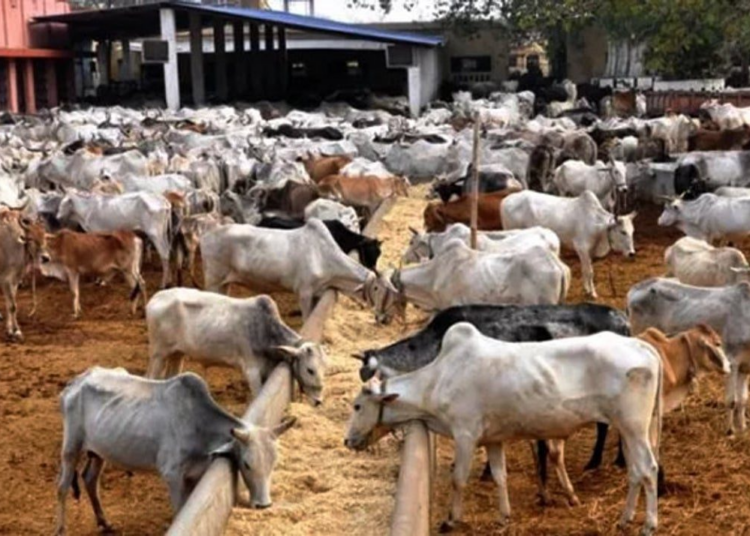The unregulated use of antimicrobials in livestock and fish farming has assumed a public health concern as farmers across Nigeria routinely administer antibiotics to their animals without prescriptions, leading to drug residues in food products such as meat, eggs and milk.
This practice, experts said, is a major driver of antimicrobial resistance (AMR) and poses direct health risks to the consumers.
In an interview with LEADERSHIP Sunday, a director at the National Veterinary Research Institute (NVRI), Vom, Plateau State, Dr Sati Ngulukun, highlighted how farmers, lacking proper guidance, often rely on hearsay or unverified advice when administering antibiotics.
He said, “Farmers just go to the market or chemist, buy antibiotics and give them to their livestock, poultry or fish without considering the dosage or withdrawal period.”
The withdrawal period is the time required for a drug to clear from an animal’s system before its products such as eggs, milk or meat are safe for human consumption. However, many farmers do not observe this crucial waiting period, leading to the presence of drug residues in food items.
“When consumers eat these products, they ingest antibiotic residues, which may contribute to antimicrobial resistance. This means that when they later need antibiotics for infections, the drugs may not work effectively,” he stated.
Despite the regulations in place, enforcement remains weak, Ngulukun said antimicrobial drugs are still widely available over the counter, contrary to international best practices.
“Antibiotics should only be sold with a prescription from a veterinarian or medical doctor. Unfortunately, in Nigeria, anyone can walk into a pharmacy or market and buy these drugs freely,” the expert lamented.
He also emphasised the role of veterinary professionals in ensuring food safety, noting that the country’s veterinarian workforce is insufficient. “Nigeria has just over 10,000 registered veterinarians, which is not enough to oversee the livestock population. Many rural areas lack veterinary services, leading to unregulated drug use,” he added.
Antimicrobials, including antibiotics, antivirals, antifungals and antiparasitics are essential for treating infections in humans, animals and plants. However, AMR occurs when bacteria, viruses, fungi and parasites evolve to resist these drugs, making infections harder and sometimes impossible to treat.
This, according to experts, leads to increased morbidity and mortality rates due to treatment failure, longer hospital stays, further straining healthcare systems, the need for more expensive antibiotics and complex treatment procedures, a higher risk of resistant hospital-acquired infections, increased complications in surgeries and routine medical treatments and financial losses in agriculture due to drug-resistant livestock diseases.
AMR is emerging as one of the greatest threats to global health, with alarming mortality rates and economic losses projected to worsen in the coming decades. Currently, AMR is associated with 4.95 million deaths annually, with 1.27 million directly attributed to drug-resistant infections. If left unchecked, experts warned that this number could double to 10 million deaths per year by 2050.
Nigeria is among the countries bearing the brunt of this, ranking 19th highest in AMR-related mortality out of 204 countries surveyed. An estimated 263,400 deaths in the country are linked to AMR each year, with 64,500 deaths directly caused by drug-resistant infections.
Beyond the human toll, AMR poses a significant economic threat. Current estimates suggest that AMR could cost the global economy up to $100 trillion, with Nigeria expected to suffer a 3.8 percent decline in GDP and a similar 3.8 percent reduction in livestock numbers by 2050.
A recent study published in the International Journal of Poultry Science, raised concerns over the presence of antimicrobial residues in commercial eggs in Nigeria, with findings suggesting that a significant number of poultry farmers do not adhere to recommended drug withdrawal periods.
The study, conducted by researchers from the National Veterinary Research Institute and several universities, surveyed 30 commercial layer farms across the country to assess drug use and screen eggs for antibiotic residues.
The results indicated that 33.3 per cent of the farms were not complying with proper drug administration guidelines, leading to contamination in eggs. Out of the 900 eggs tested, 3.6 per cent were found to contain antimicrobial residues, with 0.1 per cent testing positive specifically for tetracycline.
The study highlighted the risks posed by antibiotic residues in poultry products, as these substances can have harmful effects on human health. The potential dangers include gastrointestinal disturbances, allergic reactions, poor foetal development, and antibiotic resistance.
Cases of severe anaphylactic reactions due to penicillin residues in chicken and skin allergies linked to sulfonamide residues in eggs have been previously documented by the World Health Organisation (WHO).
The research found that while 96.5 per cent of farmers treated their poultry with antibiotics, only 74.1 per cent were aware of drug residues in animal products. Also, despite 89 per cent of respondents being aware of withdrawal periods, nearly a third (32%) admitted to not observing them.
According to the study, 97.4 per cent of veterinary respondents acknowledged the widespread misuse of veterinary drugs, and 90 per cent believed that poultry products from animals under treatment should be condemned to protect consumers.
The researchers recommend urgent measures to mitigate the issue, including stricter regulations on the sale of veterinary drugs, restrictions on the production and marketing of medicated poultry feed, and enhanced public education on the risks associated with drug residues.
The study also advocates for mandatory registration of poultry farms with state veterinary services and the promotion of cooperative farming to enable better financial management and access to veterinary expertise.
Another study published in the International Journal of Environmental Research and Public Health also raised concerns over increasing antimicrobial resistance (AMR) in food, animals and the environment across the country. The research highlights a troubling rise in resistance to commonly used antibiotics, posing significant risks to food safety and public health.
It analysed various antibiotic classes, revealing that β-lactam derivatives were the most tested, with high resistance levels observed, particularly to amoxicillin-clavulanic acid. Quinolones, aminoglycosides, macrolides, and tetracyclines also showed alarming resistance patterns, with tetracycline and streptomycin recording the highest levels.
The study called for urgent government intervention, including standardised AMR surveillance, stricter regulations on antibiotic use in food animals, and improved biosecurity measures.
Meanwhile, an expert in Animal Health and Antimicrobial Resistance (AMR), Dr Nafiu Lawal, from the Faculty of Veterinary Medicine, Usman Danfodiyo University, has emphasised the potential of prebiotics and probiotics as alternatives to antibiotics in animal farming.
Speaking on the issue, he explained how these solutions can improve animal health while reducing the overreliance on antibiotics, which contributes to antimicrobial resistance.
Dr Lawal defined prebiotics as plant-based substances that enhance the health of animals and humans, improving their overall well-being. “Prebiotics, just like antibiotics, play a crucial role in health management, but instead of killing bacteria, they promote the growth of beneficial microbes,” he stated.
He further explained the concept of probiotics, which involve introducing non-harmful bacteria into the system. These beneficial bacteria compete with harmful pathogens for resources, ultimately suppressing their population and preventing disease. “Just like in human communities where people need food, space, and shelter to survive, these microorganisms also compete. When we introduce good bacteria, they naturally outnumber and suppress harmful ones, leading to better health outcomes,” he added.
Dr Lawal shared an interesting study conducted by a PhD student under his supervision, which investigated the use of bitter leaf as a prebiotic and growth promoter. The study, though yet to be published, showed promising results, demonstrating the potential of herbal alternatives in improving animal health and productivity. He mentioned that parts of the study had been presented at the Nigeria Veterinary Medical Association conference in Lagos.
He told LEADERSHIP Sunday that many farmers use antibiotics primarily for prophylaxis to prevent diseases in their animals. However, he argued that better farm management, proper nutrition and the use of probiotics and prebiotics can achieve the same preventive results without the risk of antibiotic resistance.
Prebiotics and probiotics for animals are already available in Nigeria, with companies such as Animal Care developing them for veterinary use. However, Dr Lawal noted that awareness among farmers remains low. He advised farmers to consult veterinary professionals when choosing prebiotics and probiotics, as different animals have specific preferences and requirements.
Over the past eight years, the country has developed two National Action Plans (NAPs) to tackle AMR. The latest, NAP 2.0 (2024 – 2028), launched on October 18, 2024, builds on previous efforts and aims to enhance surveillance, promote responsible antibiotic use, improve infection prevention, and invest in research.
Also, NAFDAC, as part of its commitment, said it has restructured its internal operations by forming the AMR-One Health (OH) Team, which comprises eight directorates, including Veterinary Medicine and Allied Products, Port Inspection and Post Marketing Surveillance. The agency has also established an Office of Research (OoR) to enhance scientific studies on AMR.
A deputy director at NAFDAC, Dr Tunde Sigbeku, said the agency plans to increase surveillance at the entry points, improve antibiotic import and export tracking and collaborate with research institutes for AMR-related studies.




